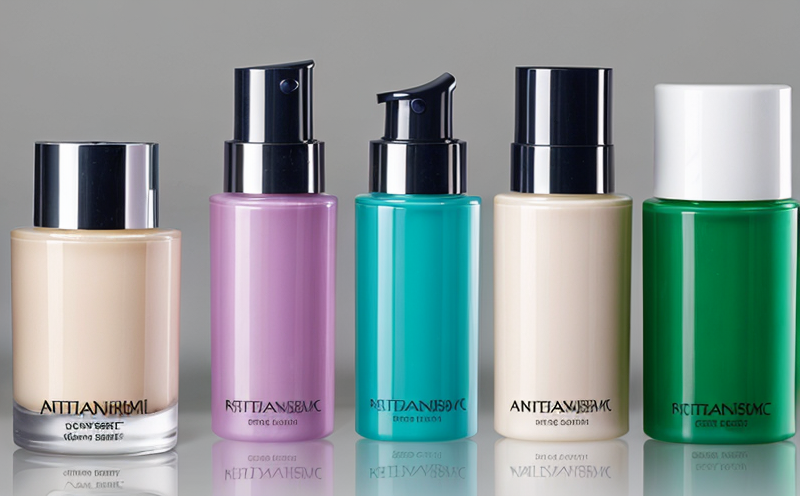Antimicrobial Testing of Preservative-Free Cosmetics
The testing of preservative-free cosmetics is a critical step in ensuring product safety and efficacy. As consumers become more aware of the potential side effects of chemical preservatives, demand for natural alternatives has increased. This service focuses on assessing the antimicrobial properties of these products without relying on synthetic preservatives.
Preservatives like parabens, methylchloroisothiazolinone (MCI)/methylisothiazolinone (MIT), and phenoxyethanol are commonly used in cosmetics. However, consumers prefer preservative-free formulations for their perceived naturalness and safety. The challenge lies in ensuring that these products remain stable and free from microbial contamination without the use of traditional preservatives.
Our testing approach involves a series of rigorous procedures designed to evaluate the antimicrobial efficacy of preservative-free cosmetics. This includes:
- Dilution studies to determine the effective concentration range against targeted microorganisms
- In-vitro testing using standardized microbial cultures (e.g., Staphylococcus aureus, Pseudomonas aeruginosa)
- Exposure time studies to assess the duration of antimicrobial action
The goal is to ensure that preservative-free products meet or exceed the required standards for microbial safety. This service aligns with international standards such as ISO 22716, which provides guidelines for the microbiological quality of personal care products.
By leveraging advanced laboratory techniques and methodologies, we provide comprehensive testing solutions tailored to the needs of the cosmetics industry. Our expertise ensures that manufacturers can confidently launch preservative-free products into markets where consumer demand is growing.
Why It Matters
The safety and efficacy of cosmetic products are paramount, especially when it comes to preservative-free formulations. Without traditional preservatives, these products must rely on natural ingredients or innovative antimicrobial agents that can effectively prevent microbial growth.
Microbial contamination in cosmetics can lead to severe health issues such as skin infections, allergic reactions, and more serious systemic conditions. Therefore, it is crucial to ensure that preservative-free formulations are capable of maintaining stability over time without compromising their safety profile.
The increasing trend towards natural and organic products has driven the demand for preservative-free cosmetics. However, this shift also presents challenges in terms of ensuring product longevity and microbial control. Our testing service addresses these concerns by providing robust data on the antimicrobial efficacy of these formulations.
Our approach ensures compliance with international standards such as ISO 22716 and ASTM D4098-15, which outline the requirements for microbiological quality in personal care products. By adhering to these guidelines, we help manufacturers meet regulatory requirements and gain market acceptance.
The results of our testing are invaluable for quality managers, compliance officers, R&D engineers, and procurement teams. These insights enable them to make informed decisions about product formulation, ingredient selection, and process optimization.
International Acceptance and Recognition
- ISO 22716: This standard provides guidelines for the microbiological quality of personal care products. Compliance with ISO 22716 is essential for ensuring that preservative-free cosmetics meet international standards.
- ASTM D4098-15: This document outlines the requirements for testing the antimicrobial efficacy of cosmetic formulations. It provides a framework for evaluating the performance of natural and synthetic ingredients in preventing microbial growth.
Our laboratory adheres to these international standards, ensuring that our testing results are recognized and accepted globally. Compliance with these standards enhances marketability and helps manufacturers navigate regulatory landscapes in different countries.
Use Cases and Application Examples
- Skincare Formulations: Testing the antimicrobial properties of preservative-free facial serums, moisturizers, and lotions to ensure their stability over time.
- Haircare Products: Evaluating shampoos, conditioners, and styling products formulated without traditional preservatives to prevent microbial contamination.
- Baby Care Products: Assessing the safety of diaper creams, lotions, and other baby care products that are free from synthetic preservatives.
- Ingredient Selection: Identifying natural or botanical ingredients with antimicrobial properties that can be used in preservative-free formulations.
- Formulation Optimization: Refining the formulation to enhance the antimicrobial efficacy of the product while maintaining its stability and sensory qualities.
The results from our testing service are instrumental in guiding these applications. By providing detailed reports on the antimicrobial performance of preservative-free cosmetics, we support manufacturers in developing safe and effective products that meet global standards.





